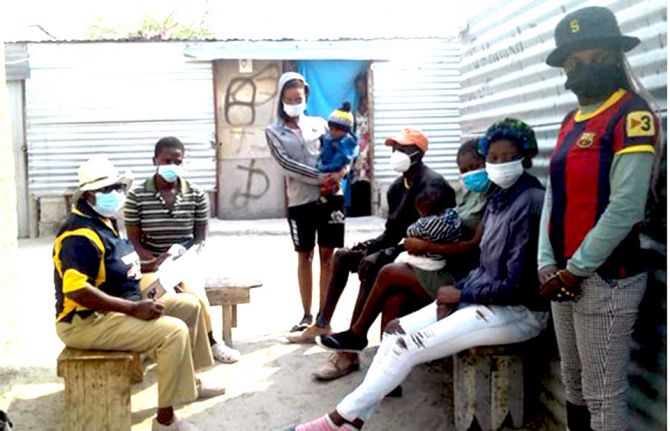

Feature Story
Partnering to strengthen community engagement in the HIV and COVID-19 responses in Namibia
12 October 2021
12 October 2021 12 October 2021In the response to the colliding COVID-19 and HIV pandemics, communities continue to demonstrate resilience, agility and innovation. To empower, train and protect communities, UNAIDS, in collaboration with the Namibian Ministry of Health and Social Services and the Africa Centres for Disease Control and Prevention, is supporting civil society organizations to implement the Partnership to Accelerate COVID-19 Testing (PACT) initiative in Namibia. In addition, community sensitization activities to reduce the spread of COVID-19, and the associated stigma and discrimination, and to minimize its effects on people living with HIV, are being implemented.
In May 2021, Namibia experienced an exponential increase in community transmission of COVID-19 cases owing to the emergence of the delta variant, which derailed the country’s containment efforts and severely stretched its health system. The nation rose to the challenge with strong political leadership and commitment. Evidence-informed and high-impact interventions led to a marked decline in cases, positivity rates and deaths.
Through the PACT initiative, four civil society organizations with experience in working with vulnerable communities and networks of people living with HIV in informal settlements were supported by the Ministry of Health and Social Services and UNAIDS to implement the PACT project. The project focuses on COVID-19 prevention and contact tracing, mitigating the impact of COVID-19 on the HIV response and facilitating access to quality health care in all 14 regions of the country and will ultimately deploy 270 community health workers.
UNAIDS is partnering with three of the four civil society organizations, working in the three regions with the highest burden of HIV and COVID-19, Oshana, Erongo and Khomas, which account for 36% of people living with HIV, 52% of COVID-19 cases and 42% of COVID-19-related deaths nationally. These civil society organizations have done remarkable work to address the needs of key populations, adolescent girls and young women, and people living with HIV using existing HIV infrastructure and systems.
“Ending the two pandemics requires greater data-driven involvement of communities, partnerships, integration of COVID-19 and HIV services and reaching underserved and vulnerable communities. This is the approach that the PACT initiative has taken in Namibia to mitigate the spread of COVID-19,” said Alti Zwandor, UNAIDS Country Director for Namibia.
To adapt, harmonize and sustain the training of community health workers, UNAIDS has been working with the National Health Training Centre, which has adapted the Africa Centres for Disease Control and Prevention training curriculum on COVID-19 to include information on vaccines, HIV and sexual and reproductive health and rights. Forty senior trainers from the training centre were trained to deliver multiple trainings across the country. A further 250 community health workers and 25 supervisors were subsequently trained and deployed to implement community outreach activities. In addition to the house visits and community sensitization activities, one of the nongovernmental organizations, the Tonata people living with HIV network, has incorporated bulk text messages with COVID-19 information in local languages to support groups for people living with HIV, thus spreading awareness of the PACT initiative to a much larger audience.
“The community health-care workers in the field experienced situations where community members were aggressive when given information on COVID-19. In some hotspots, the population also complained of hunger and indicated that they would only engage with community health-care workers once provided with some food hampers so they could concentrate,” said Agatha Kuthedze, Director of the Namibia Planned Parenthood Association (NAPPA). She added that the organization had referred people in need of social welfare to the authorities for further help.
The initiative will continue to build on the successes and integrate critical HIV and sexual and reproductive health and rights programming while continuously exploring innovations for a sustained and comprehensive HIV response. The partner nongovernmental organizations involved are Tonata, the Walvis Bay Corridor Group, NAPPA and Project Hope.


